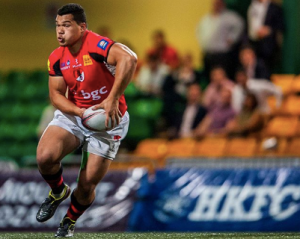How the World Tens Series plans to revolutionise rugby

Ahead of the World Tens Series kicking off in sunny Bermuda this weekend, Chief Development Officer James Walker is eager to share his long term vision for the series, what fans should expect this weekend, and his ambition for Tens to become the IPL of rugby.
Tens may be new to many fans, but from the outset Walker dispels the presumption that it is just a quicker version of 15s or a more structured version of Sevens. “It’s not strictly just rugby union. It’s an amalgamation of rugby union, rugby league and then we’ve got some American football elements in it as well.”
This was totally intentional, as the World Tens Series are very keen to enter the American market rather than only focusing on the Western European and southern hemisphere monopolies that have historically dominated rugby. The series wants to attract crossover athletes , including those from American football or athletics, who have slipped through the net.
“Every year about 1,000 players get cut from the NFL alone and there are guys who can run [100m] in 9.99 and still can’t make the US national team. There’s bucketloads of talent, not just in the US but around the word, that fall through the crack for various reasons.”
Walker knows better than most. As well as being involved in the World Tens Series, he is the co-founder of Tiger Rugby, a high performance academy who helped Perry Baker take up rugby aged 27 after being cut from the NFL. Within 12 months, Baker was playing the World Rugby Sevens Series and has since become the only man to win World Rugby Sevens Player of the Year Award twice.
Team GB silver medalist and England 7s captain, Tom Mitchell, will be one of many stars in Bermuda
Broadening the player pool and fanbase is what Walker believes will help the rugby grow worldwide, especially Stateside. “If you look at the global value of rugby versus the value of sport in the United States, it’s absolutely tiny. Rugby is the third biggest sport in the world but the US sports market is $80 billion a year, while rugby is only about 1% of that.”
To combat this, the series has come up with a business model that’s unique in rugby. This mini Series in Bermuda is something of a COVID-friendly soft launch, but when the full tour kicks off in August 2021 all 16 franchises and the twelve weekend locations, will be privately owned, which means that there are 28 different licenses available.
Private ownership on this scale is only matched in the IPL [cricket’s most lucrative non-international tournament] and Formula 1. Currently there are no plans to limit the total squad size for the series. This means that in the future some of the world’s best 15s may be tempted to try their hand at Tens.
“The (Tens) season will be totally opposite to Super Rugby and the World Sevens Series and even then, if you’ve got a wealthy British owner who says, ‘I want Owen Farrell to represent the London Royals for four weeks,’ then why not? It’s their money to spend.”
England Captain Owen Farrell could even have a stint on the World Tens Series in the future
There also wouldn’t be a salary cap, meaning players could “make serious compensation” on top of their current contracts. Spots will be reserved in each team for emerging talent, while a salary floor of $1,000 US per week (including preseason and training camps) will be in place to protect players.
This emerging talent is what Walker is most looking forward to watching this weekend. “We spend a lot of time with these combine athletes and I’m really hoping we get a couple of style moments from one of these boys.”
There are various rule changes to help attract new supporters. There are no draws, rollings subs, games are shorter with only two 10 minute halves and there’s a new concept of conversion jeopardy, where teams can choose to earn up to five points for the extras, depending on the difficulty of the kick.
When questioned about whether these new rules will anger current rugby fans, Walker doesn’t hesitate. “To be successful we need to be an entertainment package first; this is something the IPL got really right. I know back then a lot of people who were traditionalists thought that the IPL was going to be the end of the world, the end of cricket. I’d argue that cricket has never been healthier [and that’s] because of the IPL. This is what we want to do for rugby.”